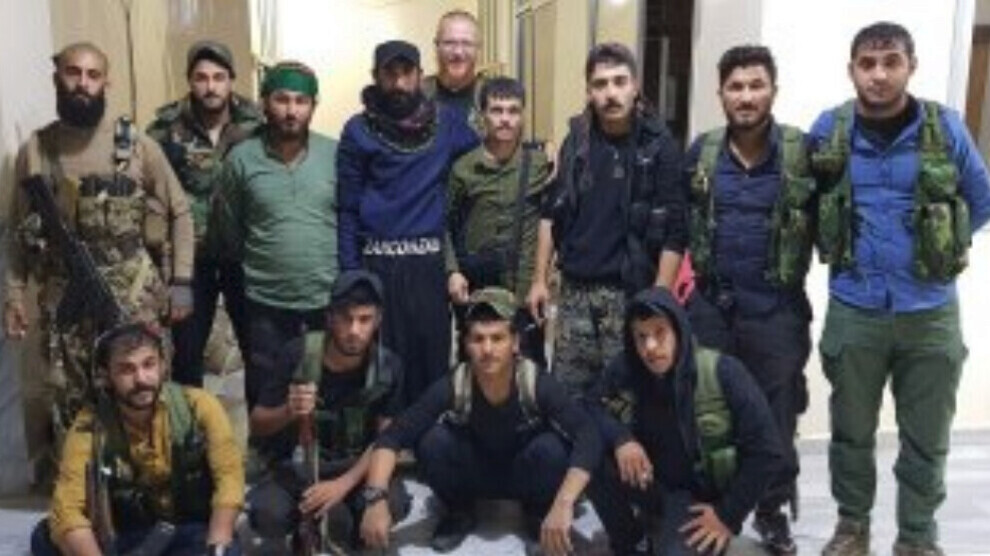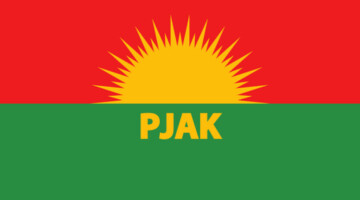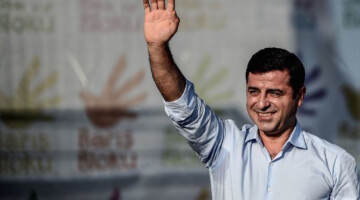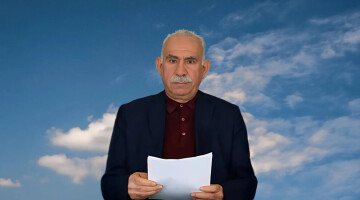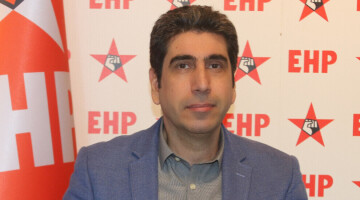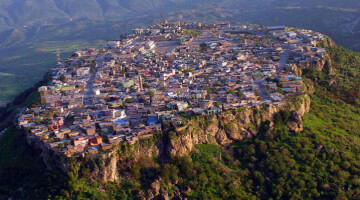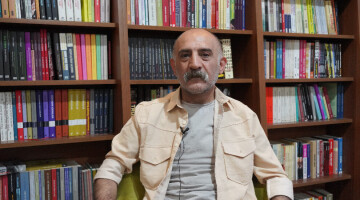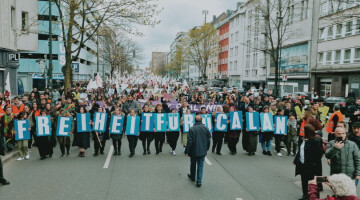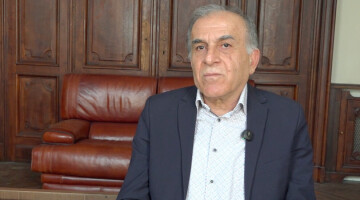The struggle against the Turkish invasion of Serêkaniyê, which began on October 9, 2019, is not called the "resistance of dignity" for nothing. Every day, hundreds of examples of courage and initiative have been shown against the superiority of jihadists and Turkish soldiers.
One of these stories of courage and resistance belongs to the group of Mîtan Qamişlo, Doğan Mele Gazi, Rizgar Arap, Cano Sabrî, Nêçîrvan Êzidî, Andok Cotkar, Riyad Qamişlo, Hacı Qamişlo, Demhat Ekla, Baran Rizo, Tekoşer, Herekol Qamişlo, Êvan Qamişlo, Can Arap and other fighters, whose name is not known, written. They came from Şengal, Qamişlo, Deir ez-Zor, Germany and Sweden, united in purpose and conviction they grew together in no time. The group jokingly called themselves "The Deserters," as many of them had left their units or the hospital to fight on the front lines in Serêkaniyê. In an interview with ANF, two survivors of the group, Mîtan Qamişlo and Herekol Qamişlo, tell the story of this unit.
Mîtan Qamişlo recounts the group's beginnings: "I was on a training course when the attacks on Serêkaniyê began. The military training was almost over. I said that I wanted to go to my unit. They told me that there were already friends there anyway. I only lasted one day. The next day I got ready and went to Qamişlo. On the way, I called my friends. They were fighters I knew from previous offensives. I talked to many of them and said, let's go to Serêkaniyê.
Mîtan Qamişlo
The group gathers
I met Heval [Comrade] Cano. He had come from a military unit from Dêrik and also wanted to go to Serêkaniyê. Then we met Cano's brothers, Can and Riyad. All three of them were with the YPG. Other friends who heard that we wanted to go to Serêkaniyê together also came. One friend's name was Demhat, he was also there. We met at the house of Heval Can.
Two of the fighters came from Şengal. A friend called and said, 'There are two friends who are going to Serêkaniyê.' We met them and asked what they wanted. They replied, 'We have also 'deserted'. Let's go together.'
Heval Doğan was also there. He had been injured in the Manbij offense and lost an eye. When he heard that we were leaving, he came along despite being injured. Another friend was Heval Baran. He had also been injured in military duties. But he still came.
There was a friend from Sweden named Nêçîrvan Êzidî. He had come to Rojava with a group of internationalists and had taken part in the offensives. He called and said, 'If you go to Serêkaniyê, wait for me.'
I knew Heval Andok Cotkar [Konstantin Gedig]. He was part of the medical staff and came from Germany. Both internationalist friends joined us.
Botan, Rizgar and Herekol had come from military units and Êvan and Cano came together. Êvan was Cano's uncle.
The group of "deserters" set out
This is how our group gathered. All of them had the same goal. The friends jokingly called the group the 'Unit of Deserters'. This group was to go to Serêkaniyê as the ‘Vanguards of Qamişlo'. For three days we made our preparations in Qamişlo. Then we went to Hesekê and informed the friends that we were going to Serêkaniyê. They asked us one by one where we came from, and we responded that we had deserted. Some others joined us there. Since we were many, we decided to go in two groups. We kept away from the population so that they would not become a target of the Turkish state.
The other group was attacked on the way to Serêkaniyê, but it arrived safely. At that time, many friends called us and said, 'Why didn't you wait, we would have come too.' All the friends who heard this rushed to Hesekê. Serêkaniyê was under siege.
We went to Serêkaniyê to the friends at the front. We divided who could use which weapons. The group that came after us also split up and took positions. Above us, many fighter and reconnaissance planes were circling.
When we left Heval Riyad's house, his mother sent all her three children with us. We sent one back. I was very moved when their mother told them, 'Keep an eye on your friends.'
The enemy could not advance on the ground. They attacked mainly from the air. They used all kinds of weapons such as jets, reconnaissance aircraft and howitzers. The mercenaries did not have the strength for an advance. They had sold themselves and were there for money. They could not stand against the people who went to the front for their people. But it was mainly warplanes that were used.
"Andok Cotkar was ready to sacrifice"
Andok Cotkar had worked in the medical field. He said, 'Whatever may come, I will go with you.' He took a BKC machine gun and declared, 'I will fight.'
Rizgar told him to take his place. The friends conducted operations so that the enemy had to retreat. They liberated three neighborhoods and pushed the enemy back. There were dead and wounded. Then the panzers came. The friends destroyed a tank with rocket launchers. Rizgar said, 'Take cover.' Andok was German, Rizgar was Arab. That's why they didn't understand each other well. Andok went out into the street. The panzer was destroyed and the enemy had to retreat. In this enthusiasm, Andok jumped into the street and shot after the enemy. Then warplanes came and attacked. Andok fell a martyr there.
The enemy could not fight the ground troops. More units of ours came to the front for reinforcements. Two friends went with Rizgar to recover Heval Andok. They too were hit by jets and martyred. The air force was extremely on the move there, as a panzer had been destroyed and the enemy had been pushed back from three neighborhoods. All three friends were killed by the massive bombardment.
I had met Şehîd Andok in Qamişlo. He was a very valuable and respected friend in every way. Whatever I would tell about him, it would be too little. We got to know each other in that war. He did his job with great joy and passion. When he took his weapon and fought, he radiated conviction. When I looked into his eyes, I could see his willingness to sacrifice his life for this people, for the democratic nation. And he did ... He was true to his word.
Şehîd Rizgar fell for his companion
Şehîd Rizgar was an Arab friend. He had been fighting since the beginning of the revolution and had participated in many battles and offensives. When you see jets or howitzers hitting a target, it's clear that you can't get out of there easily. But Şehîd Rizgar went there for his companion. That is what comes to light in war and under hail of bombs, a spirit of deep comradeship. He and Şehîd Andok knew each other only a few days. But this spirit brought them together.
Whatever we would say about this group, about these martyrs, would be too little. They were sacrificial and revolutionary people."
Herekol Qamişlo
Herekol Qamişlo, also part of the "deserters" group, talks about his experiences and his relative Şehîd Rızgar: "I have been fighting in the revolution since 2013 and have taken part in many battles and offensives. I was working in the Deir ez-Zor area at the time of the attacks and was on vacation in Qamişlo. I still had two days of leave. Heval Mîtan had called Şehîd Rizgar and said, 'Let's meet in Qamişlo and go to Serêkaniyê.' We were going to Serêkaniyê to sacrifice ourselves if necessary. I called the command of my unit and said that I would participate in the battle of Serêkaniyê. But they refused. Nevertheless, Şehîd Rizgar and I went with another friend to Mîtan in the Qudirbeq neighborhood in Qamişlo.
Şehîd Rizgar, Botan and I were from the same village. We had all participated in many offensives before. There were other friends there with whom we went to Serêkaniyê. On the way, we had a small quarrel with Şehîd Rizgar. He did not want me to go to Serêkaniyê because his brother Agit had fallen before his eyes. What if I also fell ...
The group is attacked
We were told, 'Let's go in two groups. You as a group stay here. If something happens in Qamişlo, you go to the front here.' I was not convinced by that. Mîtan and Rizgar, who had taken command, set off. Şehîd Kendal and two friends I didn't know before couldn't stand it, so we followed them. There were five of us. We followed both groups as reinforcements.
In Hesekê we were stopped. The friends did not want us to go to Serêkaniyê. But we insisted and set out for Serêkaniyê anyway. On the way, we were bombed near an emergency site of the Kurdish relief organization Heyva Sor. But that didn't deter us, and we moved on. We wanted to go to our friends no matter what.
When we reached Serêkaniyê, all I wanted was to go to Şehîd Rizgar and fight alongside him. I found out that Rizgar was on the frontline. Heval Mîtan did not let us go there. But we were stationed on two strategically important roads. We thought we could play a role here.
We talked with Şehîd Rizgar over the radio. But the enemy kept interfering with the communication. We made a few phone calls. Then Heval Mîtan warned us not to communicate our positions over the phone. We couldn't make any more calls after that for security reasons. That put some strain on our morale. But we still said that whether we died or were injured, we would fight to the end.
When I met Heval Mîtan, I asked him about Şehîd Rizgar. He told me he was at the front. I saw a friend who was in the same group as Şehîd Rizgar. He knew he had fallen but did not tell me. He just said he was injured and resisted. So, in revenge, I went on the attack with four friends. I was also wounded in this attack.
Rizgar fell with his head held high
As we moved towards Til Temir, I learned that Rizgar had fallen. Rizgar walked the path of martyrs with his head held high. What was most impressive was the spirit of comradeship. Whether Kurdish, Arab or Syriac ... We were all together and without differences on the same resistance front. Today we continue the resistance in Til Temir.
Whatever happens, we will not allow the Turkish state to occupy this land. It is not a shame that the Turkish state could invade here, but it is a shame if it survives here. We will liberate the occupied territories from Turkish occupation."

